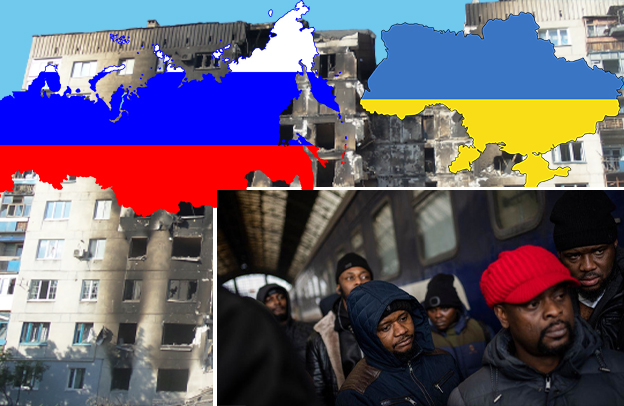The Russian-Ukraine Conflict – Looking At African Food and Economy

Russia and Ukraine are the major producers of wheat, sunflower, aluminum, and nickel, not to talk of petroleum, gas, and weapons. The two former Soviet neighbors play a key role in the world’s supply of raw materials, both to the west and to many African countries.
Download the first chapter of The Storytelling Series: Beginners’ Guide for Small Businesses & Content Creators by Obehi Ewanfoh.
But do Africans really have an alternative? Better still, are we thinking about it? I want to believe we do.
Since the beginning of the conflict, the Thursday 24th of February 2022, the global economy has been suffering from a serious fever. While things are still relatively calm in many countries in Africa, the fear of what lies ahead is a sign of worry for many countries on the continent.
You might also like to read – Why A No-Fly Zone Is Not An Option In The Russian – Ukraine Conflict
In an article written by Wandile Sihlobo, a Senior Fellow at the Department of Agricultural Economics, Stellenbosch University, South Africa, it was stated as followed:
“African countries imported agricultural products worth $4 billion from Russia in 2020. About 90% of this was wheat, and 6% was sunflower oil. Major importing countries were Egypt, which accounted for nearly half of the imports, followed by Sudan, Nigeria, Tanzania, Algeria, Kenya, and South Africa.”
Russia and Ukraine are significant players in the global commodities market. Before the war, Russia was producing around 10% of the total global wheat in the market while Ukraine was about 4%.
A BBC report on the same story pointed out a different angle for reflection – the diplomatic angle among African leaders.
“The war in Ukraine,” said the article “could have a devastating effect on some African states, threatening their economies and seeing governments come under diplomatic pressure to take sides in the escalating feud between Russia and Western powers.”
Going further, the BBC article cited a UK-based Africa Confidential publication, Patrick Smith, who said that the war offered massive opportunities for oil – and gas-producing countries.
This brings the top oil-producing countries in Africa, like Nigeria and Libya to the spotlight. And what do such countries have in common? You already know that by now…
They are both suffering from the curse of oil, one product economy, and the deliberate refusal to develop their human resources. The same situation is responsible for the mass migration of young Africans out of the continent.
Here is another article you might like – The Russia-Ukraine Conflict – First Effect On Africans
Of course, this is true of many countries in the world that have not invested in the human development of their people, but instead, keep exploring one extremely rich natural resource.
They will and always rise and fall on that single product economy, leading to a disoriented population, mass poverty, corruption, and they always reproduce their kinds.
Today, the United States and its western allies are terrified by Russian moves in Ukraine and while there is the noise of sanctions here and there, guess what they have not been able to do yet, “take their eyes off Russian supply of oil and gas”.
Here is where better preparation is needed for the oil-producing countries in Africa, like Nigeria, Angola, Libya, Algeria, and the rest who could benefit from the wind of change.
But do we have the right men in the right places so they can make the right decision to benefit the people? I don’t know and I’m certainly not talking of enriching a few people on the seats of power and fattening their overseas bank accounts.
The following is a short clip from the earlier cited article from BBC, “Ukraine crisis and Africa: The effects on oil, students and bread”
“Europe has to rapidly find alternatives to Russian gas, and the most reliable alternatives are in Africa. It’s a great opportunity for African states to move in, and get new deals done quickly”.
The second part of this conversation is the bread.
You see. A lot of African countries are today complaining of the disruption of wheat importation from Ukraine and Russia, two countries which together are pulling some %14 of the global wheat production and through that process, giving jobs to their population.
That in itself is an interesting angle in the conversation.
African agricultural lands are the most under-tapped resource in the content and yet we complain of no food to feed the population.
Here is another article you might like – The Russian-Ukraine Conflict – Looking At African Food and Economy
Yes, there is another huge opportunity, Africa has the youngest in world population demography and a large proportion of that has not been truly engaged to power the local economies.
I know some will argue that land cultivation is not an attractive adventure in Africa. But let us not forget that our lives depend on it.
If it’s not attractive, it simply means that we have not made it so, just like Ukraine and Russia have done with their food production, so they could export to feed our population.
What I am saying is that African countries need to take a holistic and deliberate plan to cultivate their land and produce food to feed their population, instead of depending on food importation from overseas.
Today we are talking about Ukraine and Russia who are short of wheat for exportation to Africa because they are currently fighting for their own survival.
The next time might be the United States, lucking horn with China and they will not be able to export food, textiles, and technology to service the African economies and feed the people.
Do you think such a thing will never happen – that your western saviors will never forsake you so they can save themselves? Grow up fellow Africans, grow up!
Here is another article you might like – The Russia-Ukraine Conflict – First Effect On Africans
This is a new type of game and when it’s truly set, you, Africans will need to stand up for yourself, produce your own arms and ammunition to defend yourself. You will need to produce your own food to feed your population, or our boat shall sink in the ocean. I mean, literally, sink and with all of us in it.
Africans, no one will defend you if they have their own priority to take care of.
What is happening in Ukraine, today is just a small warning. We can either learn and prepare ourselves for the future or we may have already chosen our fate.
Download the first chapter of The Storytelling Series: Beginners’ Guide for Small Businesses & Content Creators by Obehi Ewanfoh.





